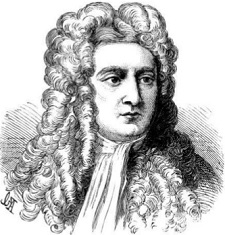Apr 15, 2025
Apr 15, 2025
 Sir Isaac Newton was born at Woolsthorpe, Lincolnshire, England in 1642. He was educated at Trinity College, Cambridge. He was one of the greatest scientific geniuses who lived between the time of Archimedes and Albert Einstein. By the age of 24 years he invented the binomial theorem, and functional calculus. He discovered the spectrum of light, and had also wrote the Theory of Gravitation, which occurred to him while he watched an apple fall from the tree in 1665.Thus, as a physicist and mathematician he developed the two as modern discipline(s).
Sir Isaac Newton was born at Woolsthorpe, Lincolnshire, England in 1642. He was educated at Trinity College, Cambridge. He was one of the greatest scientific geniuses who lived between the time of Archimedes and Albert Einstein. By the age of 24 years he invented the binomial theorem, and functional calculus. He discovered the spectrum of light, and had also wrote the Theory of Gravitation, which occurred to him while he watched an apple fall from the tree in 1665.Thus, as a physicist and mathematician he developed the two as modern discipline(s).
In 1667 Newton was elected a fellow at Trinity College. While at Cambridge he developed his Three Laws of Motion:
(i) Inertia: Every 'body' left to itself free of any other action will remain at rest or will continue to move at a constant velocity if it is in motion.
(ii) Motion: An unbalanced force applied to the body gives it an acceleration proportional to the force and the direction of the force.
(iii) Reaction: When a body A exerts a force on a body B. In return B exerts an equal and opposite force on the body A., i.e., to every action there is an equal and opposite reaction.
Newton also invented the reflector telescope, which differed from the simpler refractor type invented by Hans Lippeshey in 1608.
In 1687 Newton demonstrated the structure of the universe, the movement of planets, and calculated the mass of the sun, the planets, and their moons. He also proved that the earth is not a perfect sphere, but rather is a spheroid, slightly flattened at the poles by the centrifugal force of its own rotation.
Newton served in the English Parliament from 1701 to 1705 and was knighted by Queen Anne in 1705. He served as president of the Royal Society from 1703 till his death at Kensington in 1727.
Newton with his hard work helped people to scientifically understand the physical form that governs all matter, ranging from the stars in the sky to the apple on the tree planted on the earth.
Newton's greatest achievement was to demonstrate that scientific principles are of universal application. In doing so he defined the nature of mass, weight, force, inertia, and acceleration.
Refnece:
"!00 men who shaped World History" by Bill Yenne, Gemini Books, New Delhi.
04-Jul-2020
More by : Dr. Frank S. K. Barar